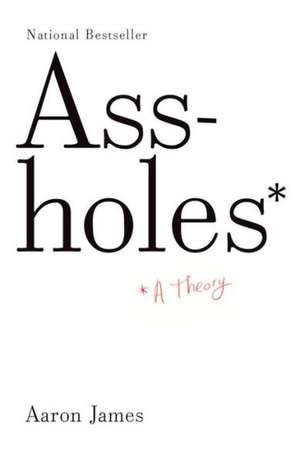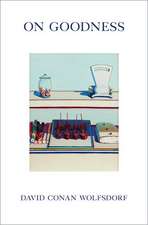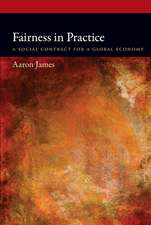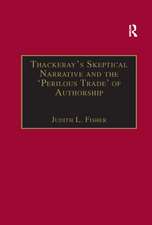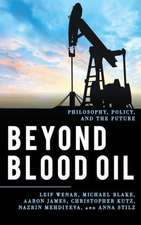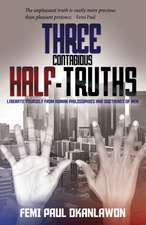Assholes: A Theory
Autor Aaron Jamesen Limba Engleză Paperback – 21 apr 2014
What does it mean for someone to be an asshole? The answer is not obvious, despite the fact that we are often personally stuck dealing with people for whom there is no better name. Try as we might to avoid them, assholes are found everywhere—at work, at home, on the road, and in the public sphere. Encountering one causes great difficulty and personal strain, especially because we often cannot understand why exactly someone should be acting like that.
Asshole management begins with asshole understanding. Much as Machiavelli illuminated political strategy for princes, this book finally gives us the concepts to think or say why assholes disturb us so, and explains why such people seem part of the human social condition, especially in an age of raging narcissism and unbridled capitalism. These concepts are also practically useful, as understanding the asshole we are stuck with helps us think constructively about how to handle problems he (and they are mostly all men) presents. We get a better sense of when the asshole is best resisted, and when he is best ignored—a better sense of what is, and what is not, worth fighting for.
| Toate formatele și edițiile | Preț | Express |
|---|---|---|
| Paperback (2) | 53.52 lei 3-5 săpt. | +43.16 lei 7-13 zile |
| John Murray Press – 23 sep 2013 | 53.52 lei 3-5 săpt. | +43.16 lei 7-13 zile |
| Anchor Books – 21 apr 2014 | 91.36 lei 3-5 săpt. | +15.39 lei 7-13 zile |
Preț: 91.36 lei
Nou
Puncte Express: 137
Preț estimativ în valută:
17.48€ • 18.30$ • 14.46£
17.48€ • 18.30$ • 14.46£
Carte disponibilă
Livrare economică 15-29 martie
Livrare express 01-07 martie pentru 25.38 lei
Preluare comenzi: 021 569.72.76
Specificații
ISBN-13: 9780804171359
ISBN-10: 0804171351
Pagini: 240
Dimensiuni: 132 x 205 x 21 mm
Greutate: 0.24 kg
Editura: Anchor Books
ISBN-10: 0804171351
Pagini: 240
Dimensiuni: 132 x 205 x 21 mm
Greutate: 0.24 kg
Editura: Anchor Books
Notă biografică
AARON JAMES holds a PhD from Harvard and is associate professor of philosophy at the University of California, Irvine. He is the author of Fairness in Practice: A Social Contract for a Global Economy, and was awarded the Burkhardt Fellowship from the American Council of Learned Societies, spending the 2009ߝ10 academic year at the Center for Advanced Study in the Behavioral Sciences at Stanford University. He’s an avid surfer (the experience of which has directly inspired this book) . . . and he’s not an asshole.
www.doubleday.com
www.doubleday.com
Extras
[ 1 ] a theory
¶In the summer of 2010, Stanley McChrystal, U.S. army general and Afghan war commander, reportedly trashed the U.S. civilian military leadership, in effect forcing President Barack Obama to ask him to resign. The display of disrespect was striking, but more telling were the details about McChrystal’s handling of smaller matters. According to one story, McChrystal was once apprised by his chief of staff that he was obliged to attend a dinner in Paris with NATO allies—if not to shore up flagging support for the war, then simply because, as the chief of staff put it, “the dinner comes with the position, sir.” McChrystal held up his middle finger, retorting, “Does this come with the position?”
For brazen disregard, General McChrystal pales in comparison to another general, Douglas MacArthur. During the Korean War, MacArthur was a law unto himself, in matters both big and small. He quarreled defiantly in public with President Truman, agitating for nuclear war. In their eventual confrontation at Wake Island, MacArthur went so far as to arrive first and then order the president’s approaching plane into a holding pattern. MacArthur’s commander in chief would thus arrive on the landing strip appearing to be MacArthur’s supplicant.
In explaining why he subsequently relieved MacArthur of his command, Truman said, “I fired him because he wouldn’t respect the authority of the president. I didn’t fire him because he was a dumb son of a bitch, although he was, but that’s not against the law for generals.” Truman was arguably pulling his punches. He could easily have called MacArthur an asshole.
That would not be an exotic charge: assholes abound in history and public life. Aside from runaway generals, we might think of such contemporary figures as former Italian president Silvio Berlusconi, Venezuelan president Hugo Chavez, or Iranian president Mahmoud Ahmadinejad. We might think of the self-important developer-entertainer Donald Trump, the harsh pop music critic Simon Cowell, or the narcissist actor Mel Gibson. Assholes are found daily on cable news, where hosts repeatedly interrupt their guests, and also on talk radio, where airtime is given to commentators who thrive on falsehood and invective. Even as this demonstrably degrades the public debate so vital for a healthy democratic society, overheated commentators get rich and famous, while clearly having a really great time.
All of this poses a larger philosophical question: What is it for someone to be an asshole? The answer is not obvious, despite the fact that we are often personally stuck dealing with people for whom there is no better name. Assholes can be found not simply in history and high public office but almost anywhere—at work; in our chosen club; sport; school; religious group; circle of friends; and even, for the truly unlucky, in the home or immediate family. Try as we might to avoid them, we often simply have to manage encounters that come, for most of us, with great difficulty and personal strain. The asshole is not just another annoying person but a deeply bothersome person—bothersome enough to trigger feelings of powerlessness, fear, or rage. To make matters worse, we may be unable to understand why exactly someone should be so disturbing. We may feel certain only that “asshole” is a suitably unsavory name for this particular person.
While most of us could use advice in asshole management, we cannot get far without an answer to our initial question: What is it for someone to be an asshole? If nothing else, a good answer—a good theory of the asshole—would be intellectually interesting. It would give us the concepts to finally think or say why some people disturb us so. That, in turn, would ideally open a window into deeper aspects of morality and social life. We would see what assholes reveal about the human social condition and why assholes are everywhere, in every society. Ideally, a good theory would be practically useful. Understanding the asshole we are stuck with might help us think constructively about how best to handle him. We might get a better sense of when the asshole is best resisted and when he is best ignored—a better sense of what is, and what is not, worth fighting for.
According to our theory, which we will present shortly, the asshole exposes a deep feature of morality that philosophers have sought to understand from the time of Jean-Jacques Rousseau to this day. The asshole refuses to listen to our legitimate complaints, and so he poses a challenge to the idea that we are each to be recognized as moral equals. This explains why the asshole is so bothersome, by revealing the great importance we attach to recognition in unexpected areas of our lives. In later chapters, we will suggest that a clearer understanding of this helps with asshole management. The key is to understand why we are easily tempted to fight on the asshole’s terms: we are fighting for moral recognition in his eyes. We will also explore larger, more basic questions about human social life. Why are assholes mainly men? Can assholes be properly blamed? Why do some societies produce more assholes than others? Are certain styles of capitalism especially prone to asshole production and thus social decline? And, finally, can we ultimately make peace not only with the given asshole but also with a human social condition in which assholes flourish?
what is it to be an asshole?
Our theory is simply this: a person counts as an asshole when, and only when, he systematically allows himself to enjoy special advantages in interpersonal relations out of an entrenched sense of entitlement that immunizes him against the complaints of other people. (Because assholes are by and large men, we use the masculine pronoun “he” advisedly. We will suggest that women can be assholes as well. For the time being, think of Ann Coulter. We consider the question of gender in detail in chapter 4.) Our theory thus has three main parts. In interpersonal or cooperative relations, the asshole:
(1) allows himself to enjoy special advantages and does so systematically;
(2) does this out of an entrenched sense of entitlement; and
(3) is immunized by his sense of entitlement against the complaints of other people.
So, for example, the asshole is the person who habitually cuts in line. Or who frequently interrupts in a conversation. Or who weaves in and out of lanes in traffic. Or who persistently emphasizes another person’s faults. Or who is extremely sensitive to perceived slights while being oblivious to his crassness with others. An insensitive person—a mere “jerk”—might allow himself to so enjoy “special advantages” in such interpersonal relations. What distinguishes the asshole is the way he acts, the reasons that motivate him to act in an abusive and arrogant way. The asshole acts out of a firm sense that he is special, that the normal rules of conduct do not apply to him. He may not deliberately exploit interpersonal relations but simply remain willfully oblivious to normal expectations. Because the asshole sets himself apart from others, he feels entirely comfortable flouting accepted social conventions, almost as a way of life. Most important, he lives this way more or less out in the open. He stands unmoved when people indignantly glare or complain. He is “immunized” against anyone who speaks up, being quite confident that he has little need to respond to questions about whether the advantages he allows himself are acceptable and fair. Indeed, he will often himself feel indignant when questions about his conduct are raised. That, from his point of view, may show that he is not getting the respect he deserves.
Although our theory is a definition of the term “asshole,” we should emphasize that it is not necessarily a dictionary definition. It is not necessarily a claim about how the word “asshole” is commonly used in some linguistic group (e.g., speakers of English). The word is often used loosely and variously, and we aren’t suggesting that every competent speaker of English would agree with our proposal about what the word means. We aren’t even saying that a majority of speakers would agree, in a way that might be confirmed or undermined by opinion polls or psychological experiments. Instead, our approach is the one Socrates explains to Polus in Plato’s Gorgias, when he explains why the dispute between them does not depend on opinion polls (what they call “the company”). Polus asks, “But do you not think, Socrates, that you have been sufficiently refuted, when you say that which no human being will allow? Ask the company.” Socrates replies:
you must not ask me to count the suffrages of the company [. . . .] I shall produce one witness only of the truth of my words, and he is the person with whom I am arguing; his suffrage I know how to take; but with the many I have nothing to do, and do not even address myself to them. May I ask then whether you will answer in turn and have your words put to the proof?
Our definition, in other words, is a constructive proposal. It tries to articulate what we ordinarily mean when we speak of “assholes” but ultimately stands or falls on whether it captures the importance assholes have for us—where the “us” is, in the first instance, you and me. I am proposing the definition in light of importance that assholes have for us. You decide whether you agree.
¶In the summer of 2010, Stanley McChrystal, U.S. army general and Afghan war commander, reportedly trashed the U.S. civilian military leadership, in effect forcing President Barack Obama to ask him to resign. The display of disrespect was striking, but more telling were the details about McChrystal’s handling of smaller matters. According to one story, McChrystal was once apprised by his chief of staff that he was obliged to attend a dinner in Paris with NATO allies—if not to shore up flagging support for the war, then simply because, as the chief of staff put it, “the dinner comes with the position, sir.” McChrystal held up his middle finger, retorting, “Does this come with the position?”
For brazen disregard, General McChrystal pales in comparison to another general, Douglas MacArthur. During the Korean War, MacArthur was a law unto himself, in matters both big and small. He quarreled defiantly in public with President Truman, agitating for nuclear war. In their eventual confrontation at Wake Island, MacArthur went so far as to arrive first and then order the president’s approaching plane into a holding pattern. MacArthur’s commander in chief would thus arrive on the landing strip appearing to be MacArthur’s supplicant.
In explaining why he subsequently relieved MacArthur of his command, Truman said, “I fired him because he wouldn’t respect the authority of the president. I didn’t fire him because he was a dumb son of a bitch, although he was, but that’s not against the law for generals.” Truman was arguably pulling his punches. He could easily have called MacArthur an asshole.
That would not be an exotic charge: assholes abound in history and public life. Aside from runaway generals, we might think of such contemporary figures as former Italian president Silvio Berlusconi, Venezuelan president Hugo Chavez, or Iranian president Mahmoud Ahmadinejad. We might think of the self-important developer-entertainer Donald Trump, the harsh pop music critic Simon Cowell, or the narcissist actor Mel Gibson. Assholes are found daily on cable news, where hosts repeatedly interrupt their guests, and also on talk radio, where airtime is given to commentators who thrive on falsehood and invective. Even as this demonstrably degrades the public debate so vital for a healthy democratic society, overheated commentators get rich and famous, while clearly having a really great time.
All of this poses a larger philosophical question: What is it for someone to be an asshole? The answer is not obvious, despite the fact that we are often personally stuck dealing with people for whom there is no better name. Assholes can be found not simply in history and high public office but almost anywhere—at work; in our chosen club; sport; school; religious group; circle of friends; and even, for the truly unlucky, in the home or immediate family. Try as we might to avoid them, we often simply have to manage encounters that come, for most of us, with great difficulty and personal strain. The asshole is not just another annoying person but a deeply bothersome person—bothersome enough to trigger feelings of powerlessness, fear, or rage. To make matters worse, we may be unable to understand why exactly someone should be so disturbing. We may feel certain only that “asshole” is a suitably unsavory name for this particular person.
While most of us could use advice in asshole management, we cannot get far without an answer to our initial question: What is it for someone to be an asshole? If nothing else, a good answer—a good theory of the asshole—would be intellectually interesting. It would give us the concepts to finally think or say why some people disturb us so. That, in turn, would ideally open a window into deeper aspects of morality and social life. We would see what assholes reveal about the human social condition and why assholes are everywhere, in every society. Ideally, a good theory would be practically useful. Understanding the asshole we are stuck with might help us think constructively about how best to handle him. We might get a better sense of when the asshole is best resisted and when he is best ignored—a better sense of what is, and what is not, worth fighting for.
According to our theory, which we will present shortly, the asshole exposes a deep feature of morality that philosophers have sought to understand from the time of Jean-Jacques Rousseau to this day. The asshole refuses to listen to our legitimate complaints, and so he poses a challenge to the idea that we are each to be recognized as moral equals. This explains why the asshole is so bothersome, by revealing the great importance we attach to recognition in unexpected areas of our lives. In later chapters, we will suggest that a clearer understanding of this helps with asshole management. The key is to understand why we are easily tempted to fight on the asshole’s terms: we are fighting for moral recognition in his eyes. We will also explore larger, more basic questions about human social life. Why are assholes mainly men? Can assholes be properly blamed? Why do some societies produce more assholes than others? Are certain styles of capitalism especially prone to asshole production and thus social decline? And, finally, can we ultimately make peace not only with the given asshole but also with a human social condition in which assholes flourish?
what is it to be an asshole?
Our theory is simply this: a person counts as an asshole when, and only when, he systematically allows himself to enjoy special advantages in interpersonal relations out of an entrenched sense of entitlement that immunizes him against the complaints of other people. (Because assholes are by and large men, we use the masculine pronoun “he” advisedly. We will suggest that women can be assholes as well. For the time being, think of Ann Coulter. We consider the question of gender in detail in chapter 4.) Our theory thus has three main parts. In interpersonal or cooperative relations, the asshole:
(1) allows himself to enjoy special advantages and does so systematically;
(2) does this out of an entrenched sense of entitlement; and
(3) is immunized by his sense of entitlement against the complaints of other people.
So, for example, the asshole is the person who habitually cuts in line. Or who frequently interrupts in a conversation. Or who weaves in and out of lanes in traffic. Or who persistently emphasizes another person’s faults. Or who is extremely sensitive to perceived slights while being oblivious to his crassness with others. An insensitive person—a mere “jerk”—might allow himself to so enjoy “special advantages” in such interpersonal relations. What distinguishes the asshole is the way he acts, the reasons that motivate him to act in an abusive and arrogant way. The asshole acts out of a firm sense that he is special, that the normal rules of conduct do not apply to him. He may not deliberately exploit interpersonal relations but simply remain willfully oblivious to normal expectations. Because the asshole sets himself apart from others, he feels entirely comfortable flouting accepted social conventions, almost as a way of life. Most important, he lives this way more or less out in the open. He stands unmoved when people indignantly glare or complain. He is “immunized” against anyone who speaks up, being quite confident that he has little need to respond to questions about whether the advantages he allows himself are acceptable and fair. Indeed, he will often himself feel indignant when questions about his conduct are raised. That, from his point of view, may show that he is not getting the respect he deserves.
Although our theory is a definition of the term “asshole,” we should emphasize that it is not necessarily a dictionary definition. It is not necessarily a claim about how the word “asshole” is commonly used in some linguistic group (e.g., speakers of English). The word is often used loosely and variously, and we aren’t suggesting that every competent speaker of English would agree with our proposal about what the word means. We aren’t even saying that a majority of speakers would agree, in a way that might be confirmed or undermined by opinion polls or psychological experiments. Instead, our approach is the one Socrates explains to Polus in Plato’s Gorgias, when he explains why the dispute between them does not depend on opinion polls (what they call “the company”). Polus asks, “But do you not think, Socrates, that you have been sufficiently refuted, when you say that which no human being will allow? Ask the company.” Socrates replies:
you must not ask me to count the suffrages of the company [. . . .] I shall produce one witness only of the truth of my words, and he is the person with whom I am arguing; his suffrage I know how to take; but with the many I have nothing to do, and do not even address myself to them. May I ask then whether you will answer in turn and have your words put to the proof?
Our definition, in other words, is a constructive proposal. It tries to articulate what we ordinarily mean when we speak of “assholes” but ultimately stands or falls on whether it captures the importance assholes have for us—where the “us” is, in the first instance, you and me. I am proposing the definition in light of importance that assholes have for us. You decide whether you agree.
Recenzii
Praise for Assholes: A Theory:
A New York Times bestseller!
"James neatly does what philosophers must do: he defines his terms, organizes and codifies, declares his own loyalties; he locates himself on the spectrum of assholery and suggest origins both psychological and sociological. The result is a delightful combination of the demotic and the technical."—Jane Smiley, Harper's Magazine
"James’ research is both thorough and imaginative; his impressive source list ranges from obscure philosophy books to popular websites to Rudyard Kipling to Kanye West, hip-hop’s greatest asshole. The author’s enthusiasm for the subject makes it possible to get through the book quickly.... [T]here are moments of great insight and outright hilarity."—Kirkus Reviews
"James's volume is equal parts philosophical meditation and historical survey, but its true value lies in his attempt to precisely define the term."—Joe Keohane, New York Magazine
“Aaron James provides us with a delightful philosophical romp through the world of assholes. I was especially tickled by his analysis of different types: smug assholes, royal assholes, the presidential asshole, corporate assholes, the reckless assholes, to name a few.”
—Robert I. Sutton, Stanford professor and author of the New York Times bestsellers The No Asshole Rule and Good Boss, Bad Boss
“Aaron James explores a very rude term that many now find unavoidable in the description of an alarming human type. His witty and accessible study of the personal and social problems the asshole creates draws on his lucid and brilliant accounts of the best in contemporary moral and political philosophy. James’s analysis of asshole capitalism is a tour de force of philosophically astute political analysis and criticism. This is a book that should appeal equally to the general reader and the philosophical specialist.”
—Marshall Cohen, founding editor of Philosophy and Public Affairs and university professor emeritus, University of Southern California
A New York Times bestseller!
"James neatly does what philosophers must do: he defines his terms, organizes and codifies, declares his own loyalties; he locates himself on the spectrum of assholery and suggest origins both psychological and sociological. The result is a delightful combination of the demotic and the technical."—Jane Smiley, Harper's Magazine
"James’ research is both thorough and imaginative; his impressive source list ranges from obscure philosophy books to popular websites to Rudyard Kipling to Kanye West, hip-hop’s greatest asshole. The author’s enthusiasm for the subject makes it possible to get through the book quickly.... [T]here are moments of great insight and outright hilarity."—Kirkus Reviews
"James's volume is equal parts philosophical meditation and historical survey, but its true value lies in his attempt to precisely define the term."—Joe Keohane, New York Magazine
“Aaron James provides us with a delightful philosophical romp through the world of assholes. I was especially tickled by his analysis of different types: smug assholes, royal assholes, the presidential asshole, corporate assholes, the reckless assholes, to name a few.”
—Robert I. Sutton, Stanford professor and author of the New York Times bestsellers The No Asshole Rule and Good Boss, Bad Boss
“Aaron James explores a very rude term that many now find unavoidable in the description of an alarming human type. His witty and accessible study of the personal and social problems the asshole creates draws on his lucid and brilliant accounts of the best in contemporary moral and political philosophy. James’s analysis of asshole capitalism is a tour de force of philosophically astute political analysis and criticism. This is a book that should appeal equally to the general reader and the philosophical specialist.”
—Marshall Cohen, founding editor of Philosophy and Public Affairs and university professor emeritus, University of Southern California
Descriere
Descriere de la o altă ediție sau format:
Aaron James gives us the concepts to think or say why a**holes disturb us so, and explains why such people seem part of the human social condition, especially in an age of raging narcissism and unbridled capitalism.
Aaron James gives us the concepts to think or say why a**holes disturb us so, and explains why such people seem part of the human social condition, especially in an age of raging narcissism and unbridled capitalism.
